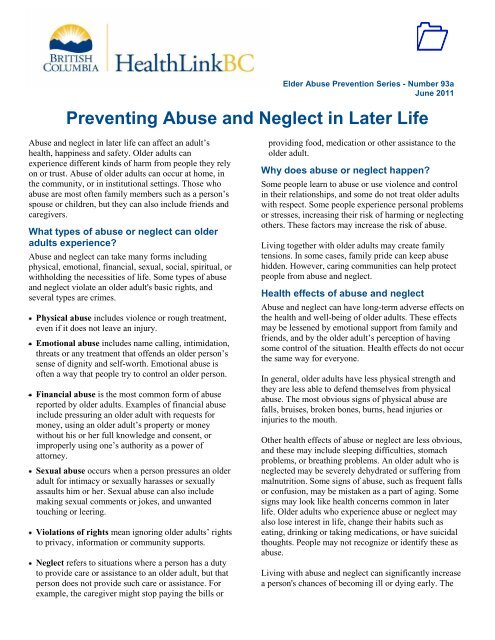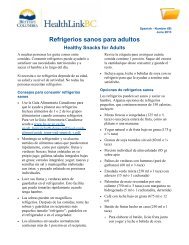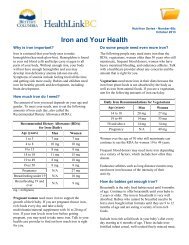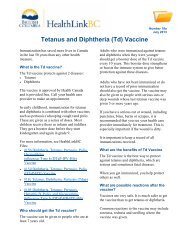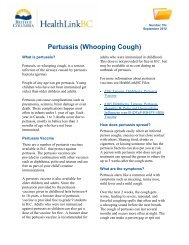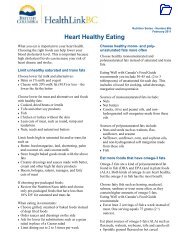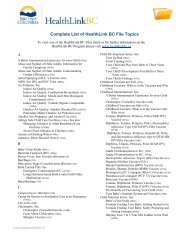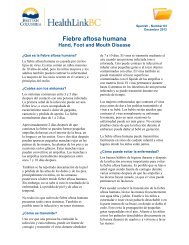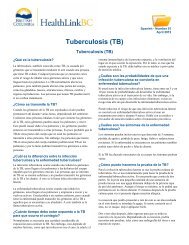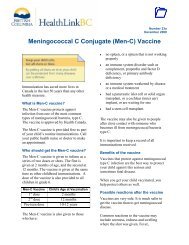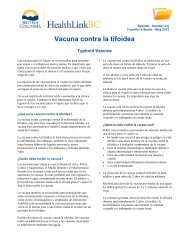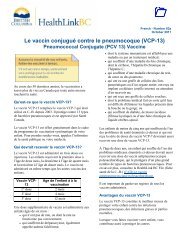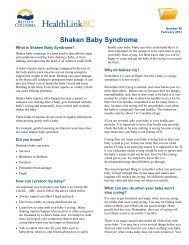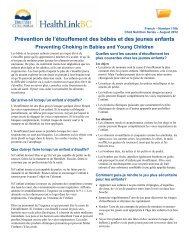Preventing Abuse and Neglect in Later Life - HealthLinkBC
Preventing Abuse and Neglect in Later Life - HealthLinkBC
Preventing Abuse and Neglect in Later Life - HealthLinkBC
Create successful ePaper yourself
Turn your PDF publications into a flip-book with our unique Google optimized e-Paper software.
Elder <strong>Abuse</strong> Prevention Series - Number 93a<br />
June 2011<br />
<strong>Prevent<strong>in</strong>g</strong> <strong>Abuse</strong> <strong>and</strong> <strong>Neglect</strong> <strong>in</strong> <strong>Later</strong> <strong>Life</strong><br />
<strong>Abuse</strong> <strong>and</strong> neglect <strong>in</strong> later life can affect an adult’s<br />
health, happ<strong>in</strong>ess <strong>and</strong> safety. Older adults can<br />
experience different k<strong>in</strong>ds of harm from people they rely<br />
on or trust. <strong>Abuse</strong> of older adults can occur at home, <strong>in</strong><br />
the community, or <strong>in</strong> <strong>in</strong>stitutional sett<strong>in</strong>gs. Those who<br />
abuse are most often family members such as a person’s<br />
spouse or children, but they can also <strong>in</strong>clude friends <strong>and</strong><br />
caregivers.<br />
What types of abuse or neglect can older<br />
adults experience?<br />
<strong>Abuse</strong> <strong>and</strong> neglect can take many forms <strong>in</strong>clud<strong>in</strong>g<br />
physical, emotional, f<strong>in</strong>ancial, sexual, social, spiritual, or<br />
withhold<strong>in</strong>g the necessities of life. Some types of abuse<br />
<strong>and</strong> neglect violate an older adult's basic rights, <strong>and</strong><br />
several types are crimes.<br />
Physical abuse <strong>in</strong>cludes violence or rough treatment,<br />
even if it does not leave an <strong>in</strong>jury.<br />
Emotional abuse <strong>in</strong>cludes name call<strong>in</strong>g, <strong>in</strong>timidation,<br />
threats or any treatment that offends an older person’s<br />
sense of dignity <strong>and</strong> self-worth. Emotional abuse is<br />
often a way that people try to control an older person.<br />
F<strong>in</strong>ancial abuse is the most common form of abuse<br />
reported by older adults. Examples of f<strong>in</strong>ancial abuse<br />
<strong>in</strong>clude pressur<strong>in</strong>g an older adult with requests for<br />
money, us<strong>in</strong>g an older adult’s property or money<br />
without his or her full knowledge <strong>and</strong> consent, or<br />
improperly us<strong>in</strong>g one’s authority as a power of<br />
attorney.<br />
Sexual abuse occurs when a person pressures an older<br />
adult for <strong>in</strong>timacy or sexually harasses or sexually<br />
assaults him or her. Sexual abuse can also <strong>in</strong>clude<br />
mak<strong>in</strong>g sexual comments or jokes, <strong>and</strong> unwanted<br />
touch<strong>in</strong>g or leer<strong>in</strong>g.<br />
Violations of rights mean ignor<strong>in</strong>g older adults’ rights<br />
to privacy, <strong>in</strong>formation or community supports.<br />
<strong>Neglect</strong> refers to situations where a person has a duty<br />
to provide care or assistance to an older adult, but that<br />
person does not provide such care or assistance. For<br />
example, the caregiver might stop pay<strong>in</strong>g the bills or<br />
provid<strong>in</strong>g food, medication or other assistance to the<br />
older adult.<br />
Why does abuse or neglect happen?<br />
Some people learn to abuse or use violence <strong>and</strong> control<br />
<strong>in</strong> their relationships, <strong>and</strong> some do not treat older adults<br />
with respect. Some people experience personal problems<br />
or stresses, <strong>in</strong>creas<strong>in</strong>g their risk of harm<strong>in</strong>g or neglect<strong>in</strong>g<br />
others. These factors may <strong>in</strong>crease the risk of abuse.<br />
Liv<strong>in</strong>g together with older adults may create family<br />
tensions. In some cases, family pride can keep abuse<br />
hidden. However, car<strong>in</strong>g communities can help protect<br />
people from abuse <strong>and</strong> neglect.<br />
Health effects of abuse <strong>and</strong> neglect<br />
<strong>Abuse</strong> <strong>and</strong> neglect can have long-term adverse effects on<br />
the health <strong>and</strong> well-be<strong>in</strong>g of older adults. These effects<br />
may be lessened by emotional support from family <strong>and</strong><br />
friends, <strong>and</strong> by the older adult’s perception of hav<strong>in</strong>g<br />
some control of the situation. Health effects do not occur<br />
the same way for everyone.<br />
In general, older adults have less physical strength <strong>and</strong><br />
they are less able to defend themselves from physical<br />
abuse. The most obvious signs of physical abuse are<br />
falls, bruises, broken bones, burns, head <strong>in</strong>juries or<br />
<strong>in</strong>juries to the mouth.<br />
Other health effects of abuse or neglect are less obvious,<br />
<strong>and</strong> these may <strong>in</strong>clude sleep<strong>in</strong>g difficulties, stomach<br />
problems, or breath<strong>in</strong>g problems. An older adult who is<br />
neglected may be severely dehydrated or suffer<strong>in</strong>g from<br />
malnutrition. Some signs of abuse, such as frequent falls<br />
or confusion, may be mistaken as a part of ag<strong>in</strong>g. Some<br />
signs may look like health concerns common <strong>in</strong> later<br />
life. Older adults who experience abuse or neglect may<br />
also lose <strong>in</strong>terest <strong>in</strong> life, change their habits such as<br />
eat<strong>in</strong>g, dr<strong>in</strong>k<strong>in</strong>g or tak<strong>in</strong>g medications, or have suicidal<br />
thoughts. People may not recognize or identify these as<br />
abuse.<br />
Liv<strong>in</strong>g with abuse <strong>and</strong> neglect can significantly <strong>in</strong>crease<br />
a person's chances of becom<strong>in</strong>g ill or dy<strong>in</strong>g early. The
stress of liv<strong>in</strong>g with abuse or neglect may also worsen<br />
other health concerns.<br />
Emotional effects of abuse <strong>and</strong> neglect<br />
Individuals who cause abuse <strong>and</strong> neglect to older adults<br />
often threaten, harass, or <strong>in</strong>timidate them. They may<br />
cause fears <strong>in</strong> older adults by threaten<strong>in</strong>g to not let them<br />
see their gr<strong>and</strong>children or threaten<strong>in</strong>g to leave them<br />
alone or place them <strong>in</strong> a residential care facility.<br />
Older adults often experience stress, worry, anxiety or<br />
depression as a result of abuse <strong>and</strong> neglect. They may<br />
feel shame, guilt, or embarrassment that someone <strong>in</strong> the<br />
family or someone close has harmed them. An older<br />
adult who feels abused or neglected usually loses trust <strong>in</strong><br />
the person who causes the harm.<br />
Some older adults who have experienced abuse earlier or<br />
throughout their lives may use alcohol or prescription<br />
drugs to help them with sleep, anxiety, or other<br />
concerns.<br />
Today, older adults are more will<strong>in</strong>g to seek counsell<strong>in</strong>g<br />
or jo<strong>in</strong> a support group to help them.<br />
<strong>Abuse</strong> <strong>and</strong> neglect can be prevented<br />
There is no law <strong>in</strong> British Columbia that requires people<br />
to report abuse <strong>and</strong> neglect of older adults. If you experience<br />
abuse or neglect, you can get help <strong>and</strong> prevent the<br />
situation from becom<strong>in</strong>g worse. There are several ways<br />
you can help an older adult who may be or feel abused<br />
or neglected:<br />
Believe the older adult if he or she confides <strong>in</strong> you<br />
about a difficult situation.<br />
Listen to the older adult <strong>in</strong> a non-judgmental<br />
manner.<br />
Recognize abuse <strong>and</strong> neglect <strong>and</strong> speak up about it.<br />
Encourage the older adult to ask a professional for<br />
confidential help.<br />
Know where to call to get help or <strong>in</strong>formation.<br />
Respect the person's choices.<br />
If you are a service provider work<strong>in</strong>g with older adults,<br />
you can help as follows:<br />
Help older adults <strong>and</strong> families learn more about<br />
their rights <strong>and</strong> responsibilities.<br />
Help older adults build or rega<strong>in</strong> their confidence<br />
<strong>and</strong> skills.<br />
Help reduce the person's social isolation.<br />
Have appropriate resources to help older adults <strong>and</strong><br />
families.<br />
Health professionals <strong>and</strong> other service providers are<br />
tra<strong>in</strong>ed to recognize the common signs <strong>and</strong> screen for<br />
abuse <strong>and</strong> neglect, <strong>and</strong> they know how to help. They can<br />
help an older adult assess his or her own personal safety,<br />
<strong>and</strong> they can help develop a safety plan.<br />
For more <strong>in</strong>formation<br />
If you see a crime or harmful situation occurr<strong>in</strong>g to an<br />
older adult, call the police or 9-1-1 immediately. You<br />
can also call 8-1-1 for <strong>in</strong>formation <strong>and</strong> advice, <strong>and</strong> speak<br />
to a registered nurse available 24/7 about nonemergency<br />
health concerns or questions. Translation<br />
services are available <strong>in</strong> over 130 languages on request.<br />
For <strong>in</strong>formation <strong>and</strong> services, you can also contact:<br />
Home <strong>and</strong> Community Care Office <strong>in</strong> your local<br />
health authority whose staff has a responsibility to<br />
<strong>in</strong>vestigate more serious reports of suspected abuse<br />
or neglect.<br />
B.C. Centre for Elder Advocacy <strong>and</strong> Support plus<br />
the Seniors Advocacy <strong>and</strong> Information L<strong>in</strong>e (SAIL)<br />
at 1-866- 437-1940 or visit www.bcceas.ca.<br />
Office of the Public Guardian <strong>and</strong> Trustee at 604-<br />
660-4444 or www.trustee.bc.ca.<br />
Legal Services Society at 604-408-2172 or toll-free<br />
at 1-866-577-2525 or visit www.lss.bc.ca.<br />
Call Victim L<strong>in</strong>k toll-free <strong>in</strong> B.C. at 1-800-563-<br />
0808 for <strong>in</strong>formation for victims of family <strong>and</strong><br />
sexual violence or crime.<br />
For more <strong>in</strong>formation, see other topics <strong>in</strong> the HealthL<strong>in</strong>k<br />
BC Files Elder <strong>Abuse</strong> Prevention Series.<br />
93b <strong>Abuse</strong> <strong>and</strong> <strong>Neglect</strong> of Older Adults: Information for<br />
Family Caregivers<br />
93c <strong>Abuse</strong> <strong>and</strong> <strong>Neglect</strong> of Older Adults: Underst<strong>and</strong><strong>in</strong>g<br />
Gender Differences<br />
93d F<strong>in</strong>ancial <strong>Abuse</strong> of Older Adults<br />
For more HealthL<strong>in</strong>k BC File topics, visit<br />
www.HealthL<strong>in</strong>kBC.ca/healthfiles/<strong>in</strong>dex.stm<br />
or your local public health unit.<br />
Click on www.HealthL<strong>in</strong>kBC.ca or call 8-1-1<br />
for non-emergency health <strong>in</strong>formation<br />
<strong>and</strong> services <strong>in</strong> B.C.<br />
For deaf <strong>and</strong> hear<strong>in</strong>g-impaired assistance,<br />
call 7-1-1 <strong>in</strong> B.C.<br />
Translation services are available <strong>in</strong> more<br />
than 130 languages on request.


